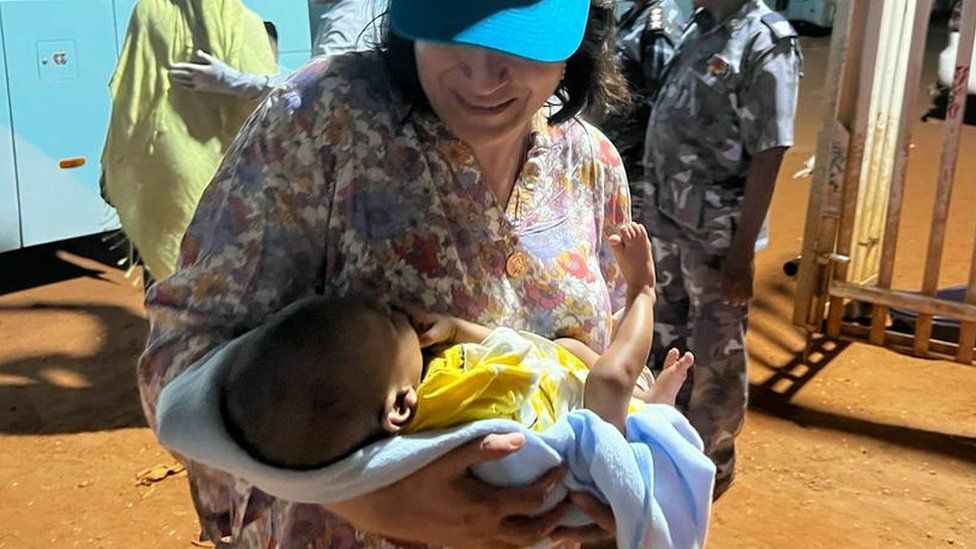297 orphans evacuated amid deadly conflict in Sudan’s capital

In Sudan’s capital, Khartoum, nearly 300 orphans have been rescued from the heart of the conflict in a dangerous evacuation carried out by humanitarian workers. This follows the tragic deaths of 67 children at the Mygoma orphanage due to starvation, dehydration, and infections, as the fighting prevented staff from reaching the facility. Since April 15, the city has experienced daily air strikes and intense clashes between the military and the paramilitary Rapid Support Forces (RSF).
In a perilous operation, 297 children, approximately 200 of them under two years old, were transported by road to Wad Madani in southern Sudan for safety. Over the weekend, a group of local activists evacuated another 95 children from the Mygoma orphanage and smaller facilities across the capital. When the war started in April, the state-run Mygoma orphanage housed around 400 children.
The situation became increasingly dangerous as many doctors and carers could not reach the orphanage to care for the children. Power and water cuts intensified the unbearable heat, with temperatures soaring as high as 43C. The youngest children began to die. “We are losing them so fast. In recent days, we lost three children,” said Sudanese activist Sadeia al-Rasheed Ali Hamid earlier this week. Unicef confirmed that 67 orphans had died at Mygoma since April 15.
Local activists and international aid organisations attempted to evacuate the children from the warzone, but it proved difficult. Ceasefire talks in Jeddah, Saudi Arabia, had failed, and full-scale fighting had resumed. Poor communication within the warring sides’ chain of command made it challenging to secure safe access to the orphanage and out of Khartoum. Moreover, transporting hundreds of children and babies posed a massive logistical challenge.
Sadeia al-Rasheed Ali Hamid, along with a few local activists, organised a private evacuation for older children aged between four and 15 years. “We extracted them from certain death to a fate that I hope is better,” said Heba Abdullah, a carer from the orphanage who accompanied the children. The first convoy of minibuses departed during the fighting, passing several checkpoints. A bedsheet with a message to the militias, stating there were children on board, was hung on the front of the first minibus.
The group found refuge in a school in the town of al-Hasaheisa, south of Khartoum. However, apart from shelter and some food provided by residents, there was little assistance for the children. “We are working on the basis of a day’s sustenance,” Heba said.
The most challenging operation was evacuating the younger children. Local volunteers, the International Committee of the Red Cross (ICRC), and Unicef collaborated with the Sudanese health ministry to organise a convoy of buses from Khartoum. The four-hour drive was gruelling, with the sound of fighting in the distance. After spending six weeks trapped in a conflict zone, most of the children were severely malnourished. “They were just so small in our arms when we were taking them,” said Marina Fakhouri, an ICRC protection delegate who travelled on one of the buses. “They just need a lot of care.”
Upon arrival, some children were immediately transferred to hospitals. One child, severely malnourished, died on Thursday morning. The hope now is to find foster families for the children. “There’s a list of foster families who have been prepared, who have been trained to stand ready to take them,” said Mary Louise Eagleton, Unicef’s deputy representative in Sudan. “That’s what’s so extraordinary, it’s really about communities coming together to help in this crisis. Even though so many people have taken in relatives, there are still so many people ready and willing to take in these highly vulnerable children.”
With an estimated 13 million children affected by the conflict and fighting continuing, hopes for a swift and peaceful resolution are diminishing. The evacuation of the orphans, according to Ms Eagleton, was a much-needed glimmer of hope. “It brought a bright ray of light to all of us.”
Latest Thailand News
Follow The Thaiger on Google News:


























